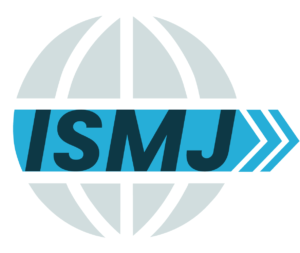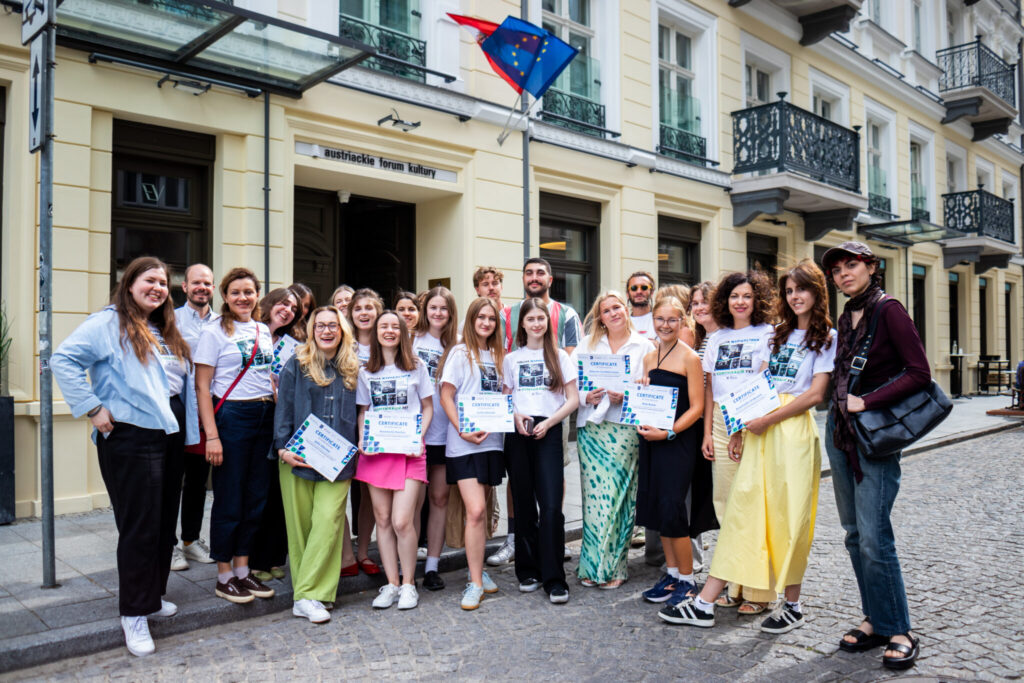In early July 2025, students from the Journalism & Media Management study programs at FHWien der WKW traveled to Warsaw for the second part of the International School of Multimedia Journalism (ISMJ). The initiative, celebrating its tenth anniversary this year, is a joint project with the School of Journalism and Communication at the Ukrainian Catholic University (UCU) in Lviv. It brings together journalism students from Austria, Denmark, Georgia, and Ukraine to collaboratively develop multimedia projects.
The program, which has existed since 2015, traditionally consists of two parts: a winter week in Vienna and a summer week in Lviv, Ukraine. Due to the Russian aggression and the ongoing war in Ukraine, the Ukrainian week of the program once again took place in Poland this year, upon invitation by the Austrian Cultural Forum in Warsaw. In addition, a new cooperation partner was welcomed this year: the Warsaw School of Economics (SGH).
The International School of Multimedia Journalism (ISMJ) uniquely combines three pillars in the education of aspiring journalists: practice-oriented work, academic engagement with thematic content, and intercultural exchange. Participating students thus have the opportunity to work in international teams under professional guidance, producing multimedia stories on complex topics while gaining valuable experience for their future careers.
“The idea is not only to give young journalists the opportunity to develop stories together with colleagues from other countries,” says Andreas Wenninger, Head of the Austrian Cooperation Office in Lviv. “It is also to provide them with meaningful intercultural and international experience. What once began as a modest attempt to connect Ukrainian and Austrian students has developed into a fully-fledged international initiative that has weathered both the pandemic and several relocations.”
“The project not only fosters journalistic quality but also builds trust across borders. Especially in turbulent times like these, it is more important than ever that young journalists learn to work together internationally,” says Daniela Süssenbacher, Head of Journalism & Media Management Study Programs at FHWien der WKW.
Artificial Intelligence and Its Impact on Society
This year’s project work focused on the theme of artificial intelligence and its effects on society, democracy, and culture. Student teams tackled concrete aspects such as the use of AI in psychotherapy, education, or surveillance. Over the course of five days, they conducted research, interviewed experts, produced video and audio content, and created multimedia pieces which were presented at the end of the week.
They were accompanied by renowned journalists and media professionals: Adela Dubaviec (Sojka.io, AFP), Khrystyna Zanyk (AFP), Oleksandra Iwaniuk (University of Warsaw), and Tetiana Kolesnychenko (Wirtualna Polska). These mentors supported the groups, offering valuable input on journalistic storytelling and helping deepen the thematic content.
Cultural Dimension and Lived Internationalism
In addition to the intensive project work, the cultural aspect of the week played a central role: participants took part in a guided tour of Ukrainian memorial sites in Warsaw, visited the Ukrainian Embassy, met with representatives of the Crimean Tatar community, and explored the region’s culinary diversity. Engaging with the current situation in Ukraine was just as present as discussions on European perspectives and the responsibility of the media.
A scientific examination of the topic was provided through the input lecture “The Impact of AI on Business and Society” by Prof. Mikołaj Pindelski, Head of the Sales Management Executive Program at the Warsaw School of Economics (SGH). He highlighted the societal challenges and opportunities posed by artificial intelligence, making them tangible through concrete examples.
A Decade of ISMJ: Looking Back and Ahead
What began in 2015 as a bilateral initiative between FHWien der WKW and the Ukrainian Catholic University (UCU) has grown into an internationally recognized educational platform. Since 2016, partner institutions from Denmark and Georgia have joined the ISMJ, and the network continues to expand in Warsaw. Over the course of ten years, more than 80 multimedia projects have been produced—on topics such as migration, climate change, or information security. The achievements of recent years, despite the pandemic and the war, underscore the resilience of the format and its significance for training the next generation of journalists in Europe.
The next edition of ISMJ is already in planning. For 2026, once again, relevant European topics will take center stage: from the role of soft power in times of conflict to AI applications and questions of democracy and human rights—issues that are crucial not only for Ukraine as an EU candidate country but for Europe as a whole.
All previously produced reports are available at: https://multimediajournalism.eu/
Thanks to the support of the Federal Ministry for Women, Science and Research (BMBWF), the OeAD Cooperation Office in Lviv, OeAD GmbH, and the Austrian Cultural Forum in Warsaw, the project was successfully carried out in its anniversary year. We thank all partner institutions for their valuable support and look forward to the next ten years of ISMJ!

Über die International School of Multimedia Journalism:Die ISMJ wurde nach der Annexion der Krim und dem Beginn des Russisch-Ukrainischen Kriegs 2014 ins Leben gerufen. Das Projekt entstand in Zusammenarbeit zwischen dem Studienbereich Journalism & Media Management der FHWien der WKW, der Ukrainisch-Katholischen Universität Lwiw und dem OeAD-Kooperationsbüro in Lemberg. Ziel war es, die Verbindung beider Länder zu stärken und ein Zeichen der Unterstützung für die Ukraine zu setzen. Seit dem zweiten Jahr ihres Bestehens sind die Danish School of Media and Journalism und das Georgian Institute of Public Affairs als weitere Projektpartner beteiligt. Weitere Informationen über die ISMJ und alle bisherigen Projektarbeiten können auf der Projekt-Website nachgelesen werden.
Das Projekt wird mit finanzieller Unterstützung durch das Bundesministerium für Frauen, Forschung und Wirtschaft (BMFWF) durchgeführt und in Kooperation mit dem OeAD-Kooperationsbüro Lemberg, der Ukranian Catholic University sowie dem Österreichischen Kulturforum Warschau umgesetzt. |
